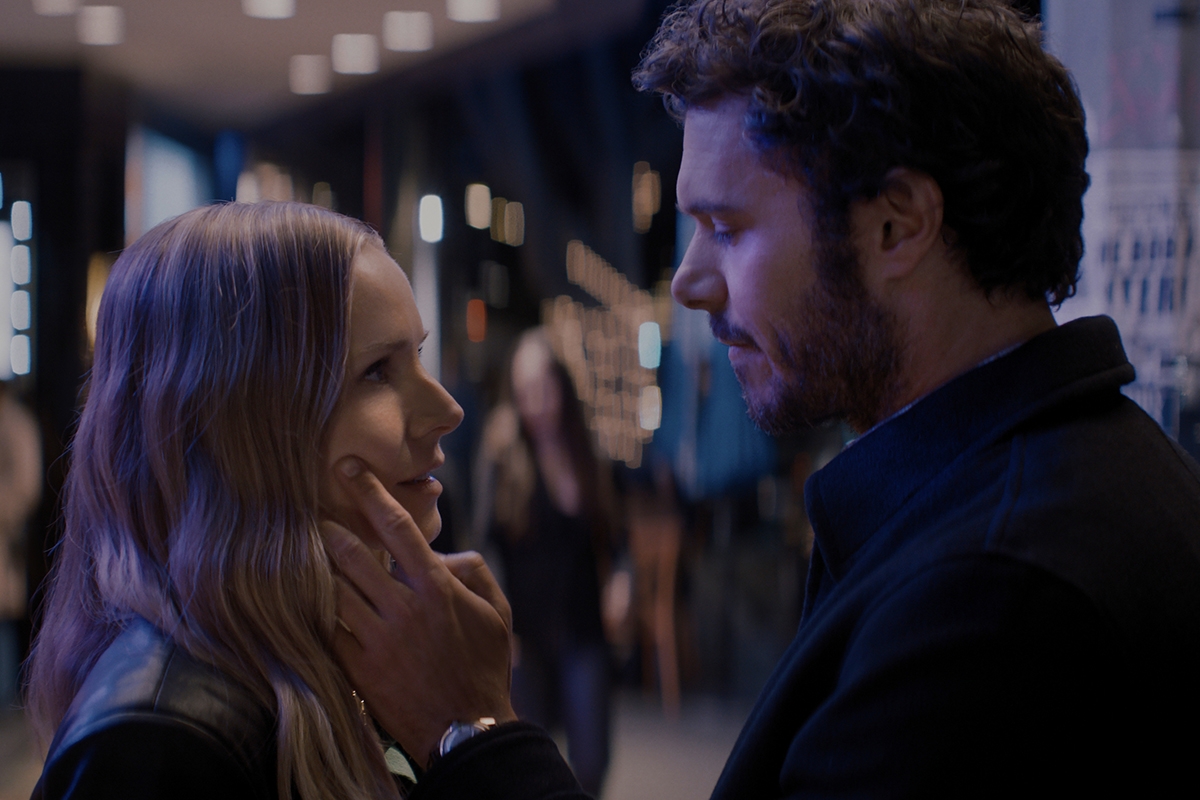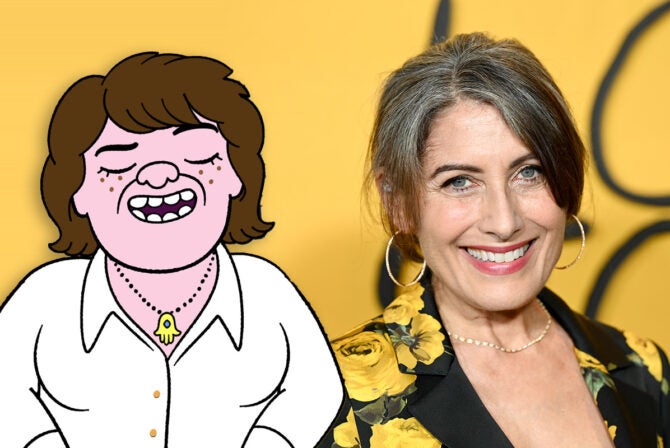In a recent episode of the podcast “Armchair Expert” by Dax Shepard, guests Kristen Bell (aka Dax’s wife) and Adam Brody shared that their new Netflix show, “Nobody Wants This,” in which Brody plays a rabbi who falls in love with a non-Jewish woman, was originally called “Shiksa.”
The main impetus for changing the name of the show? “Nobody knows the word shiksa,” Shepard, who, like his wife, grew up in the Metro Detroit area with a not-so-small Jewish population and heard the word often enough, shared. Bell was shocked that nobody knows that word, especially as a fan of the Jason Robert Brown musical “The Last Five Years,” which features the song “Shiksa Goddess.” Brody revealed that for a while, he mourned the original title.
In a bit of an ode to that song, Shepard the described a shiksa as “a blonde gentile goddess who woos the Jewish boy away from the tribe” and adds, “It’s such a great word.”
“It’s great,” Brody, who grew up Jewish in San Diego, where his own was the only bar mitzvah he attended, agreed in the interview.
I’m here to ask: But is it?
Personally, I recoil every time I hear the word “shiksa” thrown around, which happens, in the case of “Nobody Wants This,” 17 times, but I’m not sure how universal a reaction that is.
Shiksa comes from the biblical Hebrew word “sheketz,” a term for something that is detested or an abomination. As a verb, it’s used to refer to how you should feel about things like unkosher bugs and animal corpses. The “ah’ or “eh” in Yiddish is added to denote the feminine. Merriam-Webster’s two definitions of the word are a bit different from Shepard’s, though his is definitely a common one. The dictionary defines it as:
- often disparaging: a non-Jewish girl or woman
- a Jewish girl or woman who does not observe Jewish precepts —used especially by Orthodox Jews
When I’ve heard it in my life, I was stunned by its casual nastiness, but the people that I love tend to avoid it, or really any kind of semi-slur about non-Jews. Most recently, I’ve heard it yelled in Yiddish at immodestly dressed Jewish girls by Haredi kids in a video shot in Jerusalem. The kids were smiling as they said it, and even the poster of the video didn’t really seem offended by it (the commenters, however, were). According to Wikipedia, it is not seen as a “severe slur” (even if one time, in Canada, in 2009, calling someone a “shiksa” was deemed a hate crime).
As mentioned above, shiksa has ancient roots, but the word does seem to have made it into English-speaking media, even if it’s still unknown by many. Long before “Nobody Wants This” and “The Last Five Years,” it was uttered in the first “talkie,” “The Jazz Singer,” in 1927: “Maybe he’s fallen in love with a shikse,” a Jewish mom wonders about her son.
I don’t think you can talk about the word “shiksa” without bringing up Philip Roth, who expounds on the fetishization of the shiksa in colorful and lurid details in his 1969 novel “Portnoy’s Complaint.”
“How do they get so gorgeous, so healthy, so blonde? My contempt for what they believe in is more than neutralized by my adoration of the way they look, the way they move and laugh and speak,” he writes. This idea of the “shiksa goddess” as synonymous with blonde bombshell — the one that Shepard brings up in his podcast — can most likely be traced directly to Roth and his big influence on American pop culture, especially in the movies of Woody Allen, who despite his current problematic designation, left an indelible mark on American cinema.
It’s hard for me to divorce this term from the sexist connotations here. In the literature of Jewish men, the shiksa is a bit of a stand-in for the more modern trope of the “manic pixie dream girl,” which film critic Nathan Rubin described in 2007 as a quirky and gorgeous female character who “exists solely in the fevered imaginations of sensitive writer-directors to teach broodingly soulful young men to embrace life and its infinite mysteries and adventures.” The shiksa exists solely to help the Jewish man feel more than that nebbishy, cerebral, neurotic stereotype — helping him feel virile and manly.
Going back to “The Jazz Singer,” which also gave us one of the first stereotypes of the Jewish mother in movies, one can also not divorce the term shiksa from the way Jewish women have been portrayed in pop culture again and again. In contrast to the manic pixie shiksa, Jewish women are almost always unattractive, loud, overbearing, a direct opposite of the American female beauty ideal. A prime and more recent example of that is “Keeping the Faith,” where Lisa Edelstein’s “too much” Jewish character is placed in direct contrast with Jenna Elfman’s Anna Reilly, the non-Jew who Rabbi Jake (Ben Stiller) truly covets. The shiksa is not just a way for the Jewish man to distance himself from his own otherness, but also from the undesirable Jewish women around him. As George Costanza tells Elaine in “Seinfeld:” “You’ve got shiksappeal. Jewish men love the idea of meeting a woman that’s not like their mother.”
In a somewhat creepy interview with William Shatner where the Jewish actor, for some reason, asks multiple times about her teenaged physique, Fran Drescher talks casually about the shiksa and how she too is unattainable perfection for Jewish women in reference to one of her first forays into showbiz, the “Miss New York Teenager Pageant.”
“I eventually was first runner-up to the blonde-hair blue-eyed shiksha who was going to be the nemesis for all of my career, although somehow I figured out how to capitalize on this,” she said, referring to her big dark curls but also to her recognizable voice and demeanor.
The sexism also standouts here because of the way the male equivalent of shiksa, “sheygetz,” is not only one that hasn’t made it to the popular English lexicon, but is often used fondly to describe over-active kids. It’s also the name of a popular early 2000s Israeli alt-rock band. In contrast, the word shiksa is immortalized in the rock song “Shiksa (Girlfriend)” by the band Against Me in which the Jewish lead singer sings to his non-Jewish first love: “To my surprise (Your white thighs)/ Hebraic neuroses ceased to be/ An angel’s conversing with me/ The new attractive to me Is divine,” an illustration, very much, of Shepard’s aforementioned description.
In Yiddish and Israeli literature, the role of the shiksa is more complex. She can be a fetishized seductress, one who sometimes does convert to Judaism, but also a plain villainess. The fear of the non-Jew mixed with contempt, and the word “goy” for non-Jews, gets even more venom in Jewish texts: “Don’t trust a goy even in your grave,” an old saying of Iraqi and Yemeni Jews asserts. A goy’s head or brain is deemed inferior — a “goyishe kop” in Yiddish means stupid. Yet these texts are more of self-preservation than anything else. Our religion often has the push and pull of assimilation and the deep desire to continue and practice our faith, isolated, unthreatened.
I think we have to address what it is specifically about the “shiksa” that is so scary. Judaism is traditionally a matrilineal religion. According to halacha, Jewish law, Jewishness gets passed down from the mother, not the father. And therefore a man marrying a non-Jewish woman who doesn’t convert means, in certain streams of Judaism that do not accept patrilineal Jews, the end of the Jewish line; their children would not be considered Jewish. In a world where so much threatens Jewish continuity, the idea of intermarriage still feels unbearable to some Jews, despite the fact that the majority of Jewish families now are intermarried and still celebrate their Judaism. It would be unfair of me to claim that the reality shown in “Nobody Wants This” of Jews who do not want their children and family members — and especially their rabbi — to marry a non-Jew, especially a non-Jewish woman, doesn’t exist, and that the word “shiksa” isn’t used in such conversations.
The sexual objectification of the shiksa still exists, too. “Shiksas are for practice,” a character in “Nobody Wants This” explains as I gasp at the screen, but I know that this is something that some Jews still say and believe.
I think the reason I find “shiksa” so personally offensive is really less about what it says about non-Jewish women, who do not deserve to be objectified and reviled, and more about what it says about us. Even if the idea of intermarriage is still complicated for some of us, using a derogatory term about someone who is non-Jewish paints us as Jews in such an ugly light. I don’t use words like “shiksa” or “goy” out of a deep love for Judaism, including the prohibition against “lashon hora,” the evil tongue that Brody’s Rabbi Noah talks about, and also the command to love our neighbors that I hold so dearly.
I do think that “Nobody Wants This” is part of a phenomenon around that word that is interesting — specifically, a way for non-Jewish women, or for former “shiksas,” to reclaim it. Drew Barrymore once called herself a shiksa in a 2013 interview. And Erin Foster, the creator of “Nobody Wants This,” is a Jewish woman who converted, a former shiksa if you will, taking a new ownership of that word. So if non-Jewish women or converts want to use the word as something fond and funny for themselves, I don’t see a problem with that. But generally, I, like writer Kylie Ora Lobell, am in favor of retiring it.
But as they say, two Jews, three opinions.








